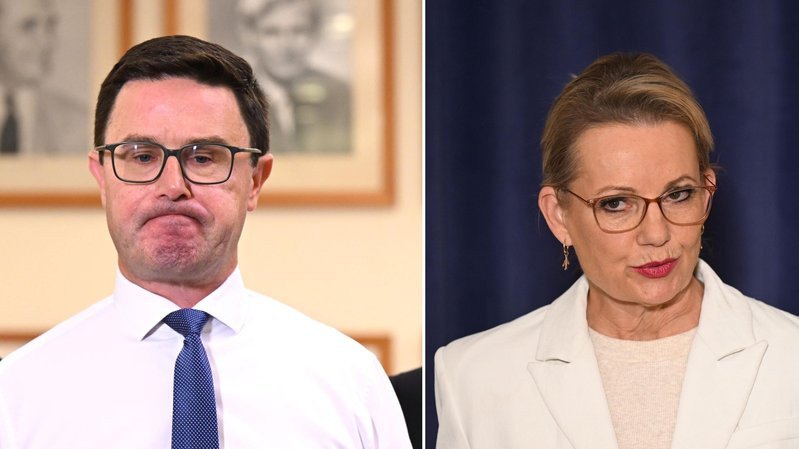AARON PATRICK How the Liberals and Nationals agreed to stop fighting
An agreement on a little-known-but-important convention may end the biggest rupture in politics in decades.

The Liberal and National parties’ decision to negotiate a return to their coalition is likely to end 48 hours of open conflict.
If their alliance resumes, which seems probable, the underlying pressures that caused the split will not go away, including the vexed question of nuclear power.
Liberal leader Sussan Ley’s promise to return the party to the “sensible centre” will be harder when coal-power advocates within the National Party have to sign off on policy.
Sign up to The Nightly's newsletters.
Get the first look at the digital newspaper, curated daily stories and breaking headlines delivered to your inbox.
By continuing you agree to our Terms and Privacy Policy.Within country communities represented by the Nationals, their temporary resignation from the Coalition, promoted as an act of principle, may look more like a mistake or gambit for power if a new coalition is formed.
The reversal happened as suddenly as the separation. Not long after noon on Thursday, Nationals leader David Littleproud, flanked by deputies Kevin Hogan and Bridget McKenzie, held a press conference in a corridor outside journalists’ offices in Parliament House.
He revealed he had met Liberal leader Sussan Ley that morning, and they agreed to start negotiations over a new coalition agreement, a normally unremarkable process that happens after every election.
“I had a brief meeting with Sussan Ley and she made an offer to reconvene her party room to discuss the four policy areas that the National Party demanded as part of a Coalition agreement,” he said.
Avoiding chaos
Crucially, Mr Littleproud dropped a request for Nationals MP to be freed from the convention of cabinet solidarity, which requires all ministers or shadow ministers to publicly support the group’s decisions. An exemption would have allowed Nationals MPs to argue against policies adopted by the Coalition, potentially creating chaos.
Mr Littleproud had planned to reveal the party’s policy spokespeople Thursday afternoon. They were sent home as “a sign of good faith”, and Ms Ley had agreed not to appoint the official shadow ministry either, he said.
He portrayed the forthcoming negotiations as an opportunity for the Liberal Party to decide if it can support his demand to keep four policies: nuclear power, country telephone subsidies, a big rural budget fund, and a law that can force supermarkets to sell outlets.
“Of course they are,” he said when asked if the policies are a requirement, not a negotiating point.
The Liberal leader did not immediately appear in public, but issued a press release soon after Mr Littleproud’s appearance claiming credit for initiating the contact between them. She emphasised the Nationals’ decision to accept cabinet solidarity.
“This is the first time this commitment has been made and I welcome it as a foundation to resolve other matters,” she said.

‘Mojo juice’
The four policies demanded by the Nationals were adopted by the last coalition, which may mean Liberal MPs will be willing to roll them over into a new joint-party agreement to end the division.
Ms Ley and Mr Littleproud could then appoint a shadow ministry, which would agree on new policies to be sent to Liberal and Nationals MPs for approval. That process should be easier without a public debate, but not necessarily easy.
Some city-based Liberal MPs believe the nuclear-power plan makes it hard to reverse the party’s losses in the cities because it is seen as a way to prolong the use of coal-driven power, which contributes to global warming. They also resent the Nationals’ desire to spend money on rural projects which do not provide as much benefit as in cities, where more people could use them.
The Nationals performed better in the election, losing only one seat, and do not want to be forced into accepting policies popular in cities that could be used by right-wing independents to challenge their hold over rural electorates in Queensland, NSW and Victoria.
Despite two former Liberal prime ministers, Tony Abbott and John Howard, urging the coalition to resume, the split was met with happiness among members of the Liberal left. Melbourne MP Tim Wilson, one of the MPs positioning himself as a future leadership contender, said on Wednesday it could help the party get its “mojo juice” back.
Cabinet solidarity
The negotiations should end the parties’ open conflict. Some Liberals had said they would remove Nationals from their Senate ticket, a step that would have likely cost two MPs their seats, including Senator McKenzie, the party’s Senate leader.
In an example of the disruption caused by the split, an adviser to Ms Ley texted a television interviewer Wednesday evening during an on-air appearance by the senator. The adviser contradicted her portrayal of the dispute, which was allegedly triggered by the Nationals’ refusal to accept cabinet solidarity.
“Her language was deliberate to make it sound like it was just about the policies,” the adviser said. “That is just not correct.”
The following morning, Mr Littleproud conceded the point in a letter to Ms Ley. Speaking to journalists, he made it sound like the issue was not particularly important.
“She made it very clear that the cabinet solidarity that we’ve had and the processes around that will remain,” he said. “That’s why it wasn’t up for debate. I thought it was fair and reasonable what Sussan Ley put back in writing.”
Now both sides have agreed on the process, they can turn to the hard part: setting policy.

